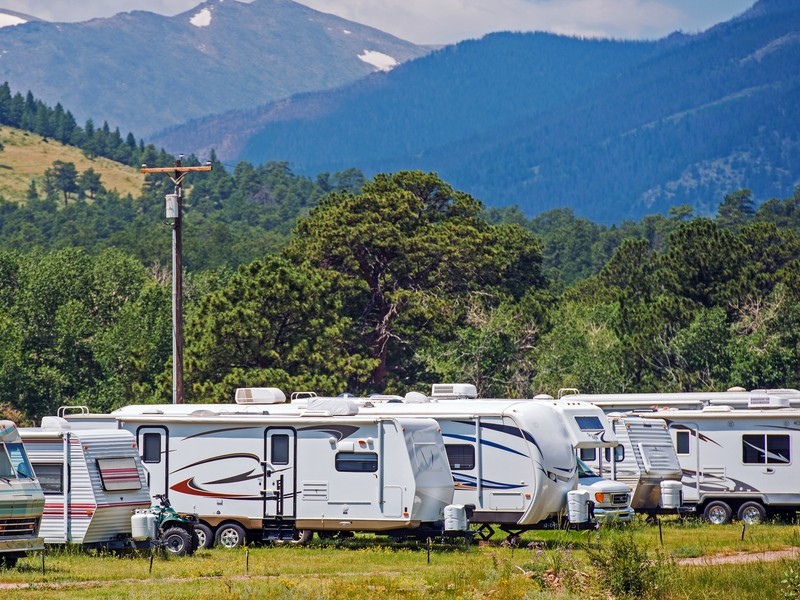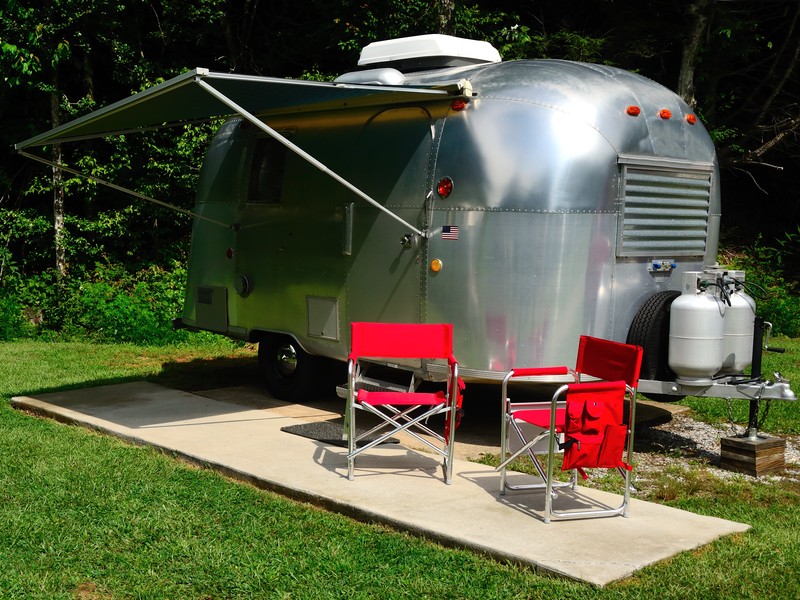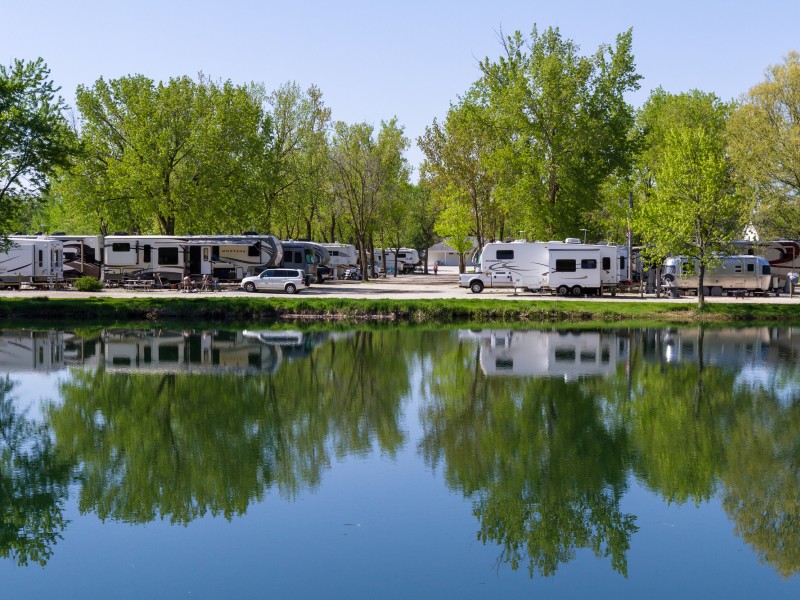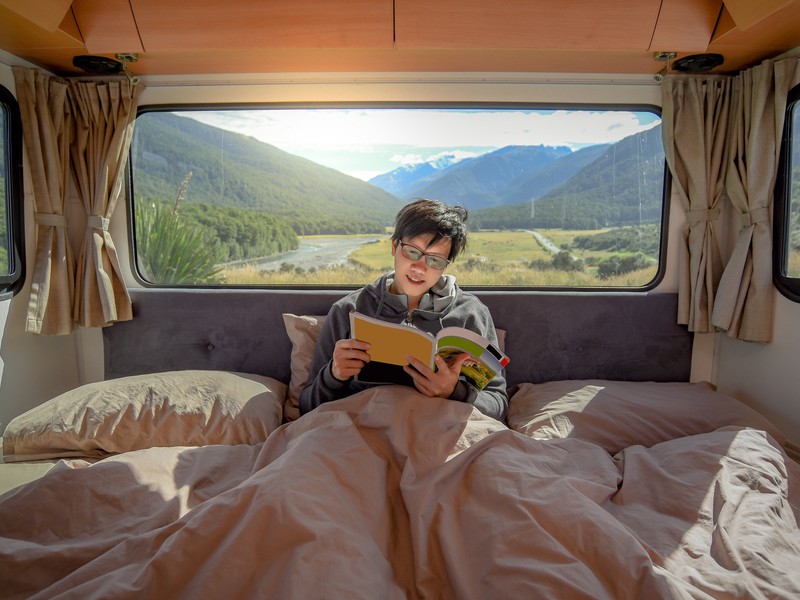If you love the RV lifestyle or need a temporary place to park your camper for an extended time, you may wonder about the cost of living in an RV park.
Many private RV parks allow full-time residents, while others permit monthly or seasonal stays. The actual cost to stay in an RV park can vary widely, but expect it to range between $400-$1,200 a month for a campsite.
However, living in an RV park has many other costs and rules. Finding a campground that fits your budget and needs will take effort, and this guide will help.
So, if you’re tired of finding locations with no RV parking signs, and are considering living in an RV park, keep reading to learn what it will cost, what to expect, the pros and cons, and the best way to reduce expenses from staff members with real-life experience.
How Much Do RV Parks Cost Per Month
If you total up all your regular living expenses, plus the cost of a campsite at an RV park, you may find it surprising that the average is about $2,000 for a single person.
Many variables will determine your exact cost, and we know of some RVers who spend under $1,000 a month and others who expend well over $3,000 a month.
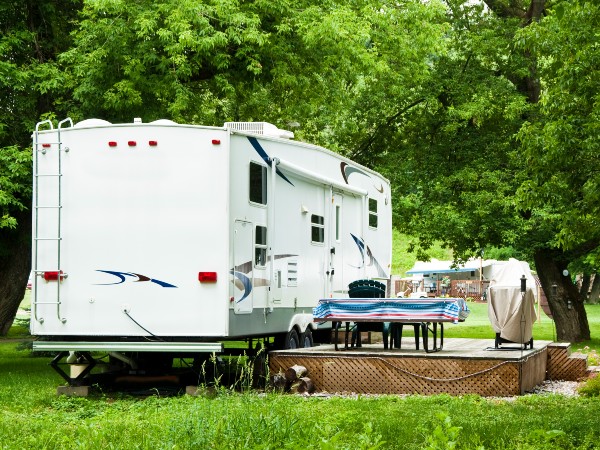
For this article, we will focus on the actual fees an RV park charges and not add in any additional expenses that you may or may not incur, such as:
- Food/groceries
- Laundry
- Electric, Wi-Fi, water, cable, and propane
- RV or vehicle loan payments
- RV, car, and health insurance
- Fuel and RV/car maintenance
- Cell phone and Wi-Fi hotspot
- Entertainment
As you can already see, living in an RV park isn’t necessarily a budget-friendly option. In most cases, living in a private RV park will cost the same as renting a studio or one-bedroom apartment.
What you’re buying into is a “lifestyle” and the freedom to experience travel and new places across the US.
Do All RV Parks Allow Full-Time Guests?
It’s beneficial to understand that most private RV parks are not “trailer parks” that allow all their sites to rent to permanent residents. While some places in snowbird country lease lots to long-term guests, most RV campgrounds make their money on overnight or weekly guests, so they cater to this demographic.
You should also note that some RV campgrounds do not allow guests to remain for more than 30 days. In addition, RV parks in popular tourist areas may only allow long-term rental during the off-season to maintain a steady income and keep the operation profitable.
State and national campgrounds allow guests to stay at a campsite for 14 days. Technically, these campgrounds are the most affordable, with an average cost of around $28 a night. However, they do not offer a long-term discount, you’ll have to pack up and move every two weeks, and most don’t offer full hookups for your camper or the extra amenities you’ll find in a private RV park.
RV Park Fees for Fulltime Guests
A recent study for 2022 shows the average nightly rate for private RV parks across the US is $40.
Most campgrounds typically offer a small discount for a weekly stay and give a generous discount on a monthly rate. For example, we see RV parks charge $55 a night for a standard full-hookup campsite and $300 for a weekly stay but only charge $620 for an entire month.
Once you find a campground you like, you’ll need to call the office. Ask about these charges to figure out the cost to live in that RV park:
- Weekly, monthly, or seasonal rate
- Separate fee for electric and water usage (metered)
- Extra fee for Wi-Fi or cable
Some RV parks include the cost of water, cable TV, and basic wireless internet in their weekly and monthly rates. However, we rarely see campgrounds that include electricity or high-speed internet in their rates.
Expect to have a meter installed at your campsite that will track your electric consumption and get a bill each month. Most RVers spend $30-$80 a month on electricity.
If you need quality internet to work remotely or for entertainment, you will have to pay the office or the local internet provider to install upgraded service in your camper. Expect this charge to be around $60 a month.
With the cost of all services rising, you should also expect to find some RV parks now charging guests that stay 30+ days a flat fee for water and cable use.
If a park offers a monthly rate, it pays to remain in one location because you’re also saving money on fuel and travel expenses versus moving every week or two. A month or more at a single RV park also allows you to fully explore the local area to see if it’s a place you want to stay longer.
If you like the idea of staying in one location for a long time, say six months to a year or more, you should look into “resort” style RV parks that cater to snowbirds or people with traveling occupations.
These RV parks either offer leases for a campsite that is yours whether your RV is there or not or provide extra discounts off the monthly rate if you agree to stay longer. For example, a park that charges $500 a month may offer a four-month rate of $1,800 or a six-month rate of $2,500, but most will expect you to pay the total amount upfront, so budget accordingly.
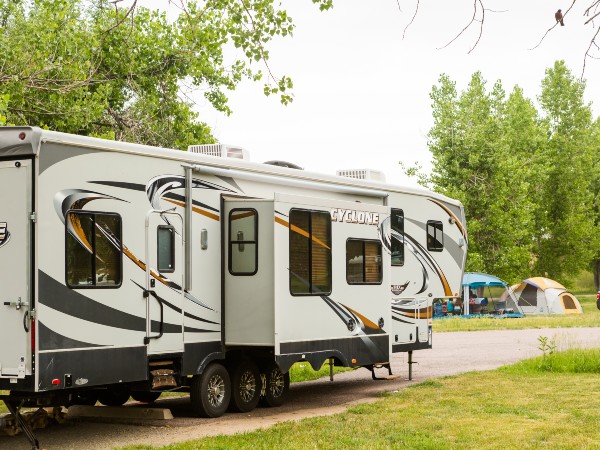
How to Find RV Parks That Allow Full-Time Residents
With the boom of RV buyers and interest in the full-time RV lifestyle, finding campgrounds where you can live long-term isn’t as easy as it once was. You can search for “long-term RV parking” or “RV seasonal parking” and the nearest city and see what pops up.
Some campgrounds love long-term guests, like 24-40 RV Park & Campground in Warsaw, North Carolina.
However, you’ll compete with more RVers to reserve the limited campsites set aside for long-term guests. Another factor is that many private RV parks are fazing out this option to avoid the problems associated with “residents” who fail to obey campground rules and ruin the experience for general camping guests.
Our best advice is to start your search in the area where you want to live, especially if you plan to work in a traditional job outside the park. For example, you may find that urban areas have no RV parks nearby that would allow an easy commute or that rural RV parks don’t offer the amenities you require, such as reliable internet service.
Part of the RV life is getting outside and taking in all the local activities, so check for things to do and see near the RV park to keep you entertained. Don’t forget that life still happens when you live in an RV park, and having a convenient grocery store, laundromat, doctor, dentist, veterinarian, and hospital within range is also crucial.
Go online and find the websites of RV parks that interest you. Look at their rate charts and see if they offer a monthly option. If you don’t see it, chances are they do not allow long-term stays or won’t discount the rate if they do. In addition, take the time to read the park’s rules and regulations to see if they align with your expectations.
Make a list of campgrounds you’re considering. Call the office and ask about long-term campsite availability, what amenities they include in the rate, and what other fees or taxes they add to the overall monthly bill.
Remember that the more amenities the RV park offers, the higher the monthly rate. After you have your list of potential RV parks ready, you can revisit their websites and make more calls to ensure you pick the best location for your needs before making a reservation.
While moving to a different RV park can be a hassle once you set up your campsite for full-time living, it does give you the most flexibility in terms of getting the best rates or location during different times of the year.
Also, remember that RV parks in popular destinations fill up early, often a year in advance, so plan accordingly if you’re on a schedule.
RV Park Living Expectations
There are two aspects to RV park living; what the guest expects and what the RV park management expects. Get it right, and you can have a wonderful camp life experience for months or years without a problem.
What RV Park Guests Expect
Many people fantasize about living in an RV park and enjoying a peaceful setting and easy access to fun activities like swimming, hiking, biking, boating, fishing, or sports. Campfires and happy hours provide plenty of social interaction, and you’ll meet friendly neighbors who are always willing to help out when the need arises.
The reality is that, yes, all of the above can happen if you live in an RV park, and that is a big reason why people do it.
However, the other reality is that as you settle into a routine based on your schedule, the other guests who are there to relax for the weekend or party for a week aren’t going to care if you need to get up for work at 5 AM, or your dog gets spooked by golf carts.
Any RV park resident needs to remember that you are “camping” and are not “special” because you have been there a long time. Therefore, you must not start complaining to management that other guests following the park’s rules are annoying you.
If you can’t adjust your lifestyle to fit the style of the RV park, then you’re the one that needs to move to a different campground.
Explore the Great Outdoors with Us!
What RV Park Management Expects of Residents
RV park management typically offers long-term campsites to a certain number of guests to have a steady stream of money for day-to-day operations.
You probably underestimate how much it costs to build an RV park. Once built, keeping a campground maintained and staff paid isn’t cheap, and offering year-round campsite rentals makes dealing with the fluctuations of high and low travel and camping seasons more manageable.
But don’t think just because you’re always there means you’re doing the RV park a favor, and you can act like you’re above their rules.
Here’s a list of the top things that aggravate RV parks the most about long-term guests:
- Letting your campsite get cluttered and dirty
- Not maintaining/washing your RV
- Leaving pets or kids outside without a leash/supervision or allowing them to intrude on other campsites
- Not cleaning up pet waste
- Speeding down park roads
- Complaining about the noise or activities of other guests (who are obeying park rules)
- Encroaching adjacent campsites with your “stuff”
It isn’t hard to get along with RV park management, maintain your RV and campsite neatly, and keep pets or kids under control. If you and the RV park staff start butting heads, it’s time to start looking for a new campground to live in.
RV Park Living Pros and Cons
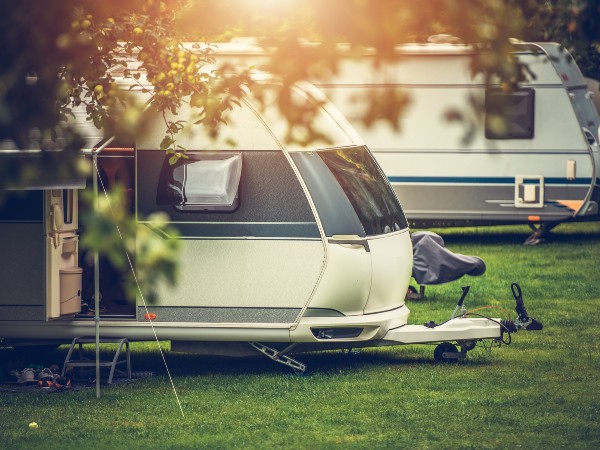
RV PARK LIVING PROS:
- If done right can be more affordable than other living options
- Simple lifestyle free of excess clutter
- Relaxed atmosphere and constant influx of new people to meet
- Pet-friendly
- Onsite amenities like a pool, games, clubs/activities, cafe, laundry, fitness center, trails, and more
- Easy to move to a new location when you want, not stuck in a lease or mortgage
RV PARK LIVING CONS:
- Can cost just as much as a home or apartment
- Weather extremes can be uncomfortable or downright scary
- Leaving RV to shower or do laundry
- Unreliable internet/cable/cell phone reception
- General lack of privacy-compact living quarters, small patio, close neighbors
- You may have restrictions on campsite decor/furniture
- Other campground guests and pets can be noisy/inconsiderate
The Best Way To Reduce The Cost To Live In An RV Park
Becoming a workamper is the best way to lower your monthly living expenses if you plan to live in an RV park.
What is a workamper? A workamper is a person who lives and works at a campground. The person may work in the office taking reservations or keeping the books, maintain campsites and park buildings, work as an activities director, or be part of the housekeeping staff cleaning bathrooms and rental cabins.
The benefits of workamping include:
- Flexible 3-12 month contracts
- Free or reduced campsite fee in return for “X” amount of hours worked
- Hourly pay for hours worked above the campsite fee requirement
- Typically no extra charge for electricity, Wi-Fi, cable, or water
- Zero commuting costs – most RV parks give workampers a golf cart to get around
- Free cabin or campsites for visiting family
- Freebies from departing guests like food, toiletries, camping supplies, etc.
Workcamping is something we highly suggest to full-time RVers who still need some source of income or need to reduce monthly expenses as much as possible. In addition, RVers who work remotely can often fit workcamping hours around their regular job schedule.
If you love state or national parks, you can bypass the 14-day limitation for guests by taking on a 3-4 month workcamping (camp host) position.
In this instance, you typically work 20 hours a week in exchange for a free campsite. This rate is per campsite, so if you RV with a partner, you can each work 10 hours a week if that suits your needs better. You can enjoy all the park offers on your time off and then sign up for to workcamp at other parks to fill out the year.
Once you get one workcamping contract under your belt, landing new contracts is pretty easy as all RV parks and campgrounds need workers. Check out Workcamper News for job postings or visit the KOA or Jellystone Parks websites to apply.
RV Park Living Wrap Up
The cost to live in an RV park is more than dollars and cents. It also includes changing your attitude about the importance of excessive personal belongings, the ability to live close to other campers, and having an open mind to new people and experiences.
If you’re frugal and workamp, you could live in an RV park for next to nothing. Or, you can choose to live in a luxury RV resort and spend $4,000 a month for the privilege.
Finding the most suitable RV park to live in that fits your budget and lifestyle takes time, but once you give it a try, you may become a full-time RVing convert!
Related Questions
- What are the hidden costs of living in an RV park?
Living in an RV park often involves hidden costs such as utility fees (electricity, water, sewage, and sometimes propane), internet or cable services, and maintenance or repair costs for the RV itself.
Additionally, there may be unexpected costs related to park amenities like laundry, pool or gym access, and costs associated with local regulations or taxes.
- How does the cost of living in an RV park compare to traditional housing?
Living in an RV park can be more cost-effective than traditional housing, as it typically involves lower costs for rent, utilities, and maintenance.
However, it’s important to consider other expenses such as RV payments, park fees, fuel, insurance, and occasional repair costs which can vary widely and may make the cost comparable to or even exceed that of traditional housing in some cases.
- What are the pros and cons of long-term stays at RV parks?
The pros of long-term stays at RV parks include cost-effectiveness, flexibility, and the opportunity to live in a close-knit community with like-minded individuals, often in attractive natural settings.
The cons, however, may include limited privacy, the potential for noise, restrictions on personalizing your space, and the lack of certain amenities that you might find in a traditional home or apartment.
- How can one reduce the cost of living in an RV park?
One can reduce the cost of living in an RV park by choosing a less expensive location, as prices can vary significantly based on geography, and by staying longer at each park, as many offer discounted rates for weekly or monthly stays.
Additionally, consider reducing utility costs by using solar power, conserving water, and managing waste efficiently, as well as minimizing expenses on entertainment and dining by taking advantage of free or low-cost activities and cooking meals in the RV.
- What should one consider when choosing an RV park for long-term living?
When choosing an RV park for long-term living, one should consider the amenities offered, such as laundry facilities, Wi-Fi, and recreational areas, as well as the park’s location in relation to necessary services like grocery stores, healthcare facilities, and public transportation.
Additionally, it’s important to consider the park’s community and rules, cost of living, safety, and the quality of its maintenance and management.
"Of all the paths you take in life, make sure a few of them are dirt."
-- John Muir
